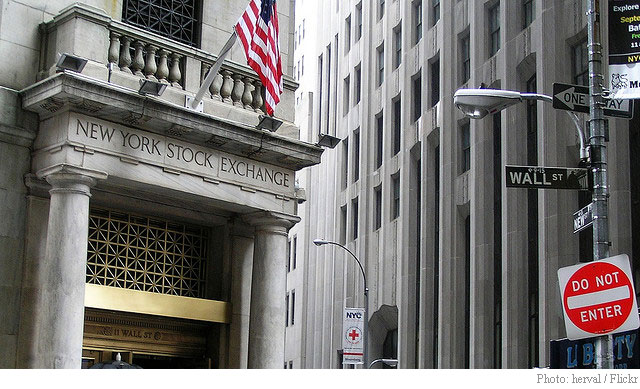Michael Lewis’s new book “Flash Boys” has exposed high frequency trader networks that jump ahead of stock orders from investors and make tiny profits on hundreds of thousands of trades throughout a routine day on Wall Street.
Those tiny trades, executed much more quickly than a blink of an eye, add up. Lewis estimates this “invisible tax” on the stock market comes to nearly $160 million a day, according to a recent New York Sunday Times adaptation of the book titled “The Wolf Hunters of Wall Street.”
High frequency trading smells a lot like “front running.” That’s the old Wall Street practice of trading a large block of stock with advance knowledge of another trade that will influence the price of the stock up or down. By trading ahead of or in front of that party, the “front runner” makes a profit and harms the other party. The Securities and Exchange Commission forbids the practice of “front running.”
Wall Street is known for its abundance of absurdities, but what makes high frequency trading particularly galling is that, because it is done by machines and not people, it is currently legal under SEC rules.
Speed is the key to gaming the system on the new Wall Street, according to Lewis. “The trouble with the stock market – with all of the public and private exchanges – was that they were fantastically gameable, and had been gamed: first by clever guys in small shops, and then by prop traders who moved inside the big Wall Street banks,” Lewis writes.
Wall Street banks showed a complete lack of ethics in bundling bad mortgages and selling them as Triple A paper before the credit crisis. The same moral malaise is in evidence from flash trading.
“The deep problem with the system was a kind of moral inertia,” Lewis writes. “So long as it serves the narrow self-interests of everyone inside it, no one on the inside would ever seek to change it, no matter how corrupt or sinister it became – though even to use words like “corrupt” and “sinister” made serious people uncomfortable.”
Lewis concludes by connecting the subprime mortgage crisis to high speed trading. And it’s not a stretch. “The same system that once gave us subprime-mortgage collateralized debt obligations no investor could possibly truly understand now gave us stock-market trades involving fractions of a penny that occurred at unsafe speeds using order types that no investor could possibly truly understand.”
It seems that the machines are in control on Wall Street. Are investors powerless to stop this computerized, flash fleecing by a thousand cuts per second?
Watch out speedsters, the Feds are investigating these traders for insider trading.
Zamansky LLC are investment and stock fraud attorneys representing investors in federal and state litigation and arbitration against financial institutions.
Disclaimer: This page contains affiliate links. If you choose to make a purchase after clicking a link, we may receive a commission at no additional cost to you. Thank you for your support!



Leave a Reply